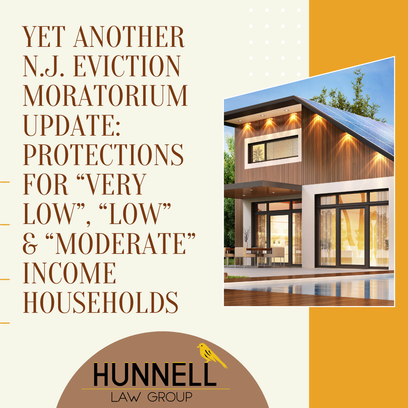|
8/2/2021 Yet Another N.J. Eviction Moratorium Update: Protections For “Very Low”, “Low” & “Moderate” Income HouseholdsRead Now By Ryan Westerman Because the flurry of legislation, executive orders, changes to that information, and the confusion surrounding the eviction moratorium over the last 16 months just hasn’t been enough for renters, the State’s legislatures passed new a bill this week. Curiously, the new bill bifurcates protections from a previous bill signed into law mere weeks ago, which extended the eviction mortarium until January 1, 2022. Bill s3691 mirrors the eviction protections from the most recent law (which statutorily codifies Governor Murphy’s Executive Orders from 2020) for “very low”, “low”, and “moderate-income” households. The bill defines very low income households as those earning annual income of 30% or less of the county’s median income; low income households earn 50% or less; moderate-income households earn more than 50% but less than 80%. Any household that earns more than 80% of their county’s median income will only be shielded from evictions until August 31st when and if the bill becomes law. The measure passed both of the State’s legislative bodies without any no votes. Pretty unprecedented given the divisive political climate. The bill now sits on the Governor’s desk. Murphy is vocal about the renters’ need for government support, made clear when he signed legislation extending the moratorium until January 1, 2022. Now, his veto of the bill will be purely ceremonial based on the voting track record of both State Senate and Assembly members. Both chambers’ votes this week are clear indication of what lies ahead. Bill s3691 makes further distinctions amongst renters. Notably, those renters whose inability to pay rent is COVID related, and those whose are not. In debt renters that fell behind for other reasons will no longer receive pandemic protection and will face eviction. This appears to strike a reasonable balance between the landlords’ needs to collect rent revenue to sustain their businesses, and the public health concern of making the most financially vulnerable sections of the population homeless, as vaccination rates rise and the pandemic peters out. What it does not do is provide any solution for the tens of thousands of New Jerseyans facing eviction in 6 months of time, but merely kicks the can down the road … all the way into 2022.
0 Comments
Leave a Reply. |
Details
Contributors:Stephanie Hunnell, Esq. , Ryan Westerman, Esq. and Caitlin Holland, Esq. Archives
April 2024
Categories
All
|
|
Hunnell Law Group, LLC is conveniently located at 908 Main Street., Asbury Park, NJ 07712
You can contact us at 732-749-3500 or by facsimile at 732-749-3503 Attorneys serving Asbury Park, Avon-by-the-Sea, Belmar, Manasquan, Bradley Beach, Freehold, Toms River, Fair Haven, Red Bank, Manalapan, Marlboro, New Brunswick, Jackson Township, Brick, Howell, Asbury Park, Ocean Township, Eatontown, Wall Township, Neptune City, Neptune Township, Spring Lake, Wanamassa, Lake Como,
Monmouth County, Ocean County, Middlesex County, and Mercer County, in Central New Jersey. |
© 2019, 2020, 2021, 2022, 2023 Hunnell Law Group, LLC, all rights reserved. Disclaimer & Site Map & Privacy Policy.
No aspect of this advertisement has been approved by the Supreme Court of New Jersey.

 RSS Feed
RSS Feed